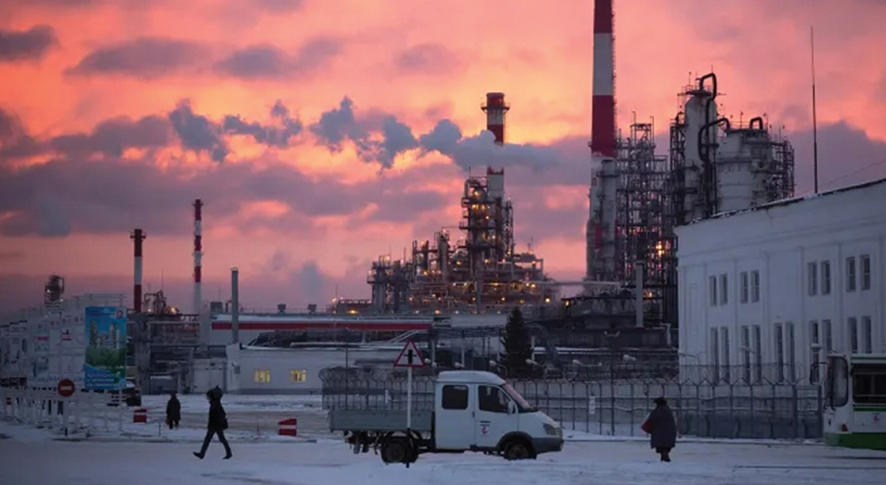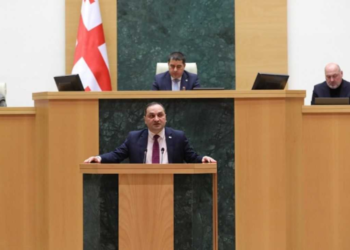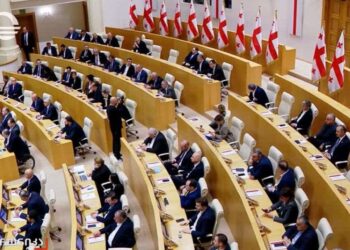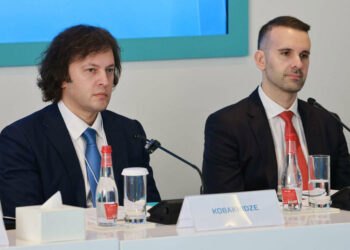Russia’s defense ministry on Tuesday claimed it had “thwarted” an armed incursion by Ukrainian armed forces and “sabotage and reconnaissance groups” in its western border regions of Kursk and Belgorod.
Earlier, anti-Kremlin armed groups, purportedly made up of Russians opposed to the Ukraine war, said they had launched an incursion across Russia’s border.
Roman Starovoit, the governor of Russia’s Kursk region, which is on the border with Ukraine, said Tuesday that a “sabotage and reconnaissance group” had tried to break into the Kursk region but had failed.
Ukraine has not commented on the Russian defense ministry’s latest claim, although a Ukrainian military spokesman confirmed earlier that rebel groups were conducting an operation on Russian territory independently of Ukraine.
The Ukraine-based Freedom of Russia Legion and the Siberian Battalion announced on their Telegram pages that they had launched attacks into Russia from Ukraine. They said they intended to “take our land away from the [Putin] regime, centimeter by centimeter” and called on Russians to boycott the forthcoming presidential election.
A third Russian rebel group, the Russian Volunteer Corps, also appeared to confirm its participation in the operation on its Telegram account.
It is unconfirmed whether Ukraine’s armed forces were also involved in the incursion, as Russia suggested, as Russia tends to characterize all Russian rebel groups as “Ukrainian saboteurs.”
This is not the first time the groups have been active, with two of the pro-Ukrainian Russian rebel groups launching raids into Russia’s Belgorod region last May and June.
The week’s drone attacks
Ukraine pounded targets in Russia on Tuesday with dozens of drones and rockets in an attack that inflicted serious damage on a major oil refinery and sought to pierce the land borders of the world’s biggest nuclear power with armed proxies.
Russia and Ukraine have both used drones to strike critical infrastructure, military installations and troop concentrations in their more than two-year war, with Kyiv hitting Russian refineries and energy facilities in recent months.
Russia said Ukrainian proxies had sought to cross the Russian border in at least seven attacks that Russian forces had repelled. The Russian-speaking Ukrainian proxies said they had breached the border, a claim denied by Russia.
In one of the biggest Ukrainian drone attacks on Russia to date, Moscow said it downed 25 Ukrainian drones over the regions of Moscow, Leningrad, Belgorod, Kursk, Bryansk, Tula and Oryol. Waves of drone attacks continued through the day, the defense ministry said.
Russian officials reported attacks on energy facilities, including a fire at Lukoil’s NORSI refinery and a drone destroyed on the outskirts of the town of Kirishi, home to Russia’s second largest oil refinery.
Gleb Nikitin, governor of the Nizhny Novgorod region, posted a picture of a fire truck beside the NORSI refinery and said emergency services were working to put out a blaze there.
Russian attack on Sumy Oblast injures 3, including children
A Russian attack on Sumy Oblast on March 12 injured three people, including two children, the region’s administration reported.
Sumy Oblast authorities say Russian forces launched two guided aerial bombs at the district of Velyka Pysarivka at 9.20am local time.
The attack reportedly injured two children, aged six and 10, and an adult. Five homes and a garage were also destroyed, The Kyiv Independent reported.
Settlements in Ukraine’s northeastern Sumy Oblast suffer from daily Russian strikes due to their proximity to the border with Russia.
Russian troops launched a total of nine strikes against parts of Sumy Oblast on March 12, regional authorities reported. Over 96 explosions were recorded.
US to send $300 million in military aid to Ukraine
The Pentagon will rush about $300 million in weapons to Ukraine after finding some cost savings in its contracts, even though the military remains deeply overdrawn and needs at least $10 billion to replenish all the weapons it has pulled from its stocks to help Kyiv in its desperate fight against Russia, the White House announced Tuesday.
The announcement came as Ukraine is running dangerously low on munitions, and US efforts to get fresh funds for weapons have stalled because of Republican opposition. US officials have insisted for months that the United States wouldn’t be able to resume weapons deliveries until Congress provided the additional replenishment funds, which are part of the stalled supplemental spending bill.
“When Russian troops advance and its guns fire, Ukraine does not have enough ammunition to fire back,” said national security adviser Jake Sullivan when announcing the $300 million in additional aid.
One official said the package represented a “one time shot,” unless Congress passes the supplemental spending bill, which includes roughly $60 billion in military aid for Ukraine, or more cost savings are found. It is expected to include anti-aircraft missiles, artillery rounds and armor systems, the official said.
“This is not a sustainable way to support Ukraine,” said Maj. Gen. Pat Ryder, Pentagon press secretary, calling it a “one-time good deal” that officials can’t plan on occurring again.

Following Pope’s Comments, NATO Chief Says Ukraine Needs Weapons, Not ‘White Flags’
NATO Secretary-General Jens Stoltenberg dismissed a call by Pope Francis for Ukraine to “raise the white flag and negotiate with Russia,” saying the best way to end the conflict is to arm Kyiv.
“If we want a negotiated, peaceful, lasting solution, and the way to get there is to provide military support to Ukraine,” Stoltenberg said on March 11 in response to a Reuters question about the Catholic leader’s comments.
“Our support to Ukraine saves lives, and it must continue. Putin started this war and he could end it today, but Ukraine does not have this option. Surrender is not peace. We must continue to strengthen Ukraine to show President Putin that he will not get what he wants on the battlefield, but must sit down and negotiate a solution where Ukraine is recognized and prevails as a sovereign, independent nation,” Stoltenberg said.
In a televised interview broadcast on March 10, the 87-year-old Pope Francis said Ukraine should have the “courage” to negotiate with Russia to save the lives of its own citizens. Tens of thousands of soldiers on both sides of the conflict have been killed since the February 2022 full-scale invasion.
“When you see that you are defeated, that things are not working out, you have to have the courage to negotiate,” the Pope said.
Later, the Vatican said that “the first condition” for peace is that Russia “put an end to its aggression.”
Cardinal Pietro Parolin, the Vatican’s secretary of state and the pontiff’s closest collaborator, told the Corriere della Sera daily on March 11 that “the Holy See pursues this line and continues to ask for a ‘cease-fire’, and the aggressors should be the ones who cease fire.”
Ukraine has recovered much of the territory Russia initially seized following the initial attack in 2022. However, Ukraine’s much-anticipated 2023 counteroffensive failed to make much progress, raising concerns the war had reached a stalemate.
Experts say that a negotiated settlement now would only benefit Russia, cementing its gains to date in Ukraine and allowing it to reconstitute its forces for a future attack. They also say that Russian President Vladimir Putin has not given up hope of conquering all of Ukraine.
Pope Francis said in a February interview that Ukraine should have what he called “the courage of the white flag” and negotiate an end to the war with Russia. A representative of the Vatican clarified that the Pope’s statement was not a call for Ukraine to surrender.
The Ministry of Foreign Affairs of Ukraine summoned Visvaldas Kulbokas, Apostolic Nuncio to Ukraine, due to Pope Francis’ recent controversial statements about the Russo-Ukrainian war.
Kulbokas was informed that Ukraine was “disappointed” by the Pope’s remarks about the “courage of the white flag” and the need to negotiate with Russia, Ukraine’s Foreign Ministry reported.
The ministry added that such claims “normalize the ‘might makes right’ mentality and encourage them [the aggressors] to further violate the norms of international law.”
Kyiv expects the Pope to “send a message to the international community about the need to immediately join forces to guarantee the victory of good over evil, and to address the aggressor, not the victim,” the ministry said in a statement.
The Apostolic Nuncio was separately reminded about the Ukrainian Peace Formula and Kyiv’s desire to achieve a just peace based on the principles of the UN Charter.
In response to Pope Francis’s statement, Polish Foreign Minister Radosław Sikorski said that the Pope should address Russian President Vladimir Putin and urge him to withdraw his occupation forces from Ukraine.
Ukraine’s Foreign Minister Dmytro Kuleba responded that Ukraine’s flag is not white, but yellow and blue.
Compiled by Ana Dumbadze














